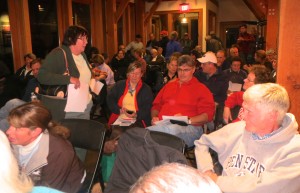
Before a standing-room crowd of more than 100, Supervisors’ Chair Janie Baird began the discussion with a detailed synopsis of the board’s efforts to craft the ordinance. Her statement was followed by more than 30 minutes of dissent from members of the equine community, comments supporting the ordinance from Supervisors Robert Pearson and Bill Kelsall, and then a unanimous vote to pass it.
Reiterating earlier remarks that the supervisors value the equestrian community, Baird ended the meeting by saying: “We love you all.” But the majority of attendees filing out of the building were not feeling the love, angrily shaking their heads and muttering criticism; a few even booed.
The ordinance to regulate horse boarding, riding schools, and competitions, which was in the works for well over a year, has been monitored by neighboring municipalities. Baird said the proposal had received the blessing of township and county planners as well as the West Marlborough Township supervisors.
Newlin’s new ordinance contains fewer restrictions than regulations in similar townships, including West Marlborough, East Nantmeal, and Londonderry, she said. It also went through numerous permutations in response to residents’ input, she said.
“The proposed ordinance has been developed in order to provide some control over potentially harmful equine operations, while attempting to limit the burden on other current and future operations,” Baird said. “A great deal of time, money, study, conversations, and debate has gone into trying to determine that balance.”
But about half a dozen residents generated loud applause as they pleaded with the board to delay passage of the ordinance, arguing that it would place undue hardships on some residents and threaten the township’s tranquil, equine-friendly environment.
In urging the supervisors not to approve the amendment, Ben Barnett, a Hilltop View Road resident, said he felt more work on it was warranted. “In its current form … the concern is that it’s actually going to perpetuate the divisions in this township,” he said.
Lisa Thomas, a Brandywine Creek Road resident who coordinated an online petition opposing the ordinance that garnered more than 1,500 signatures, asked people in the audience to stand if they had attended the meeting in response to the proposed ordinance. Only a handful of people remained seated.
Thomas then asked those who wanted to see the ordinance passed to sit down. When the crowd stayed on its feet, Thomas said, “I think that speaks pretty loudly for Newlin Township.”
Supervisor Robert Pearson pointed out that laws protect the community. He said the absence of zoning in 1979 led to an unwelcome landfill that the township was unable to fight. Bill Kelsall added that the township supports small businesses. “This is not about shutting anybody down; this is about making people legal,” he said.
At the September meeting, the township’s solicitor, John Good, said residents would have 30 days to apply for a special exception and/or variance so that anyone who wanted to be governed by the existing ordinance, a process that requires a $1,500 fee, would have that opportunity. After the meeting, Baird said six residents had applied.
Baird said residents still have five days from the vote to become “grandfathered” under the previous law. Those with equine operations will need to study the differences between the two ordinances to determine whether or not to apply within that time frame.
According to a township handout, the new ordinance allows horse boarding as an accessory use without a special exception from the zoning hearing board as long as the property contains three acres for the first horse and two acres for additional ones; there is no requirement that all acreage be fenced.
Under the previous ordinance, all horse-boarding operations required a special exception, a 10-acre minimum, and two acres of fenced pasture for the first horse and one acre of fenced pasture for each additional animal.
Under the previous ordinance, riding schools were not permitted without a special exception and a 10-acre minimum; shows and events were not allowed. The new ordinance also requires a special exception but contains the same acreage requirements as the new horse-boarding provision and permits shows and events by special exception.

Comments